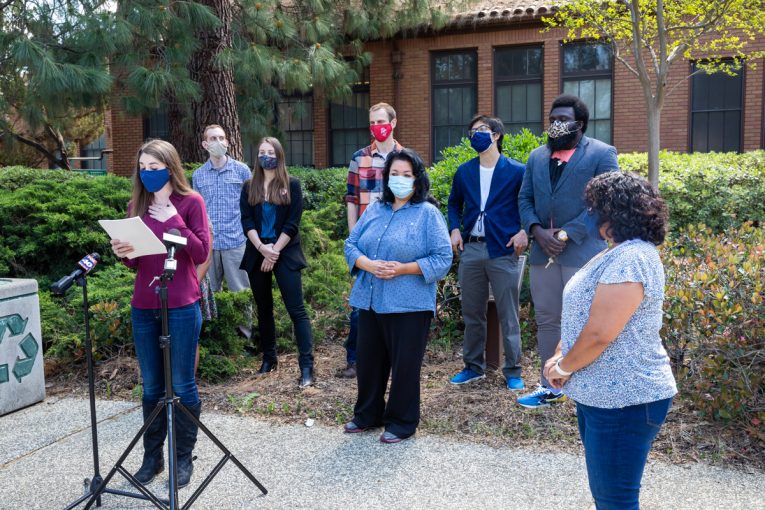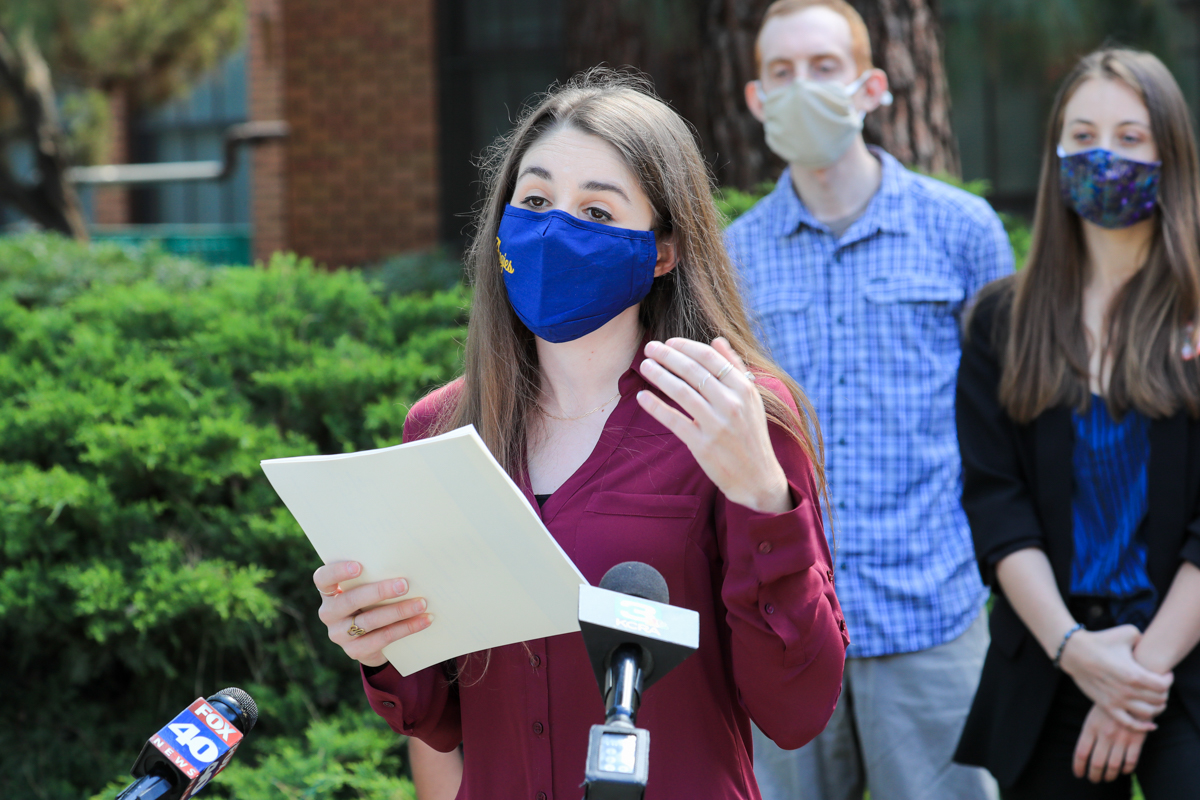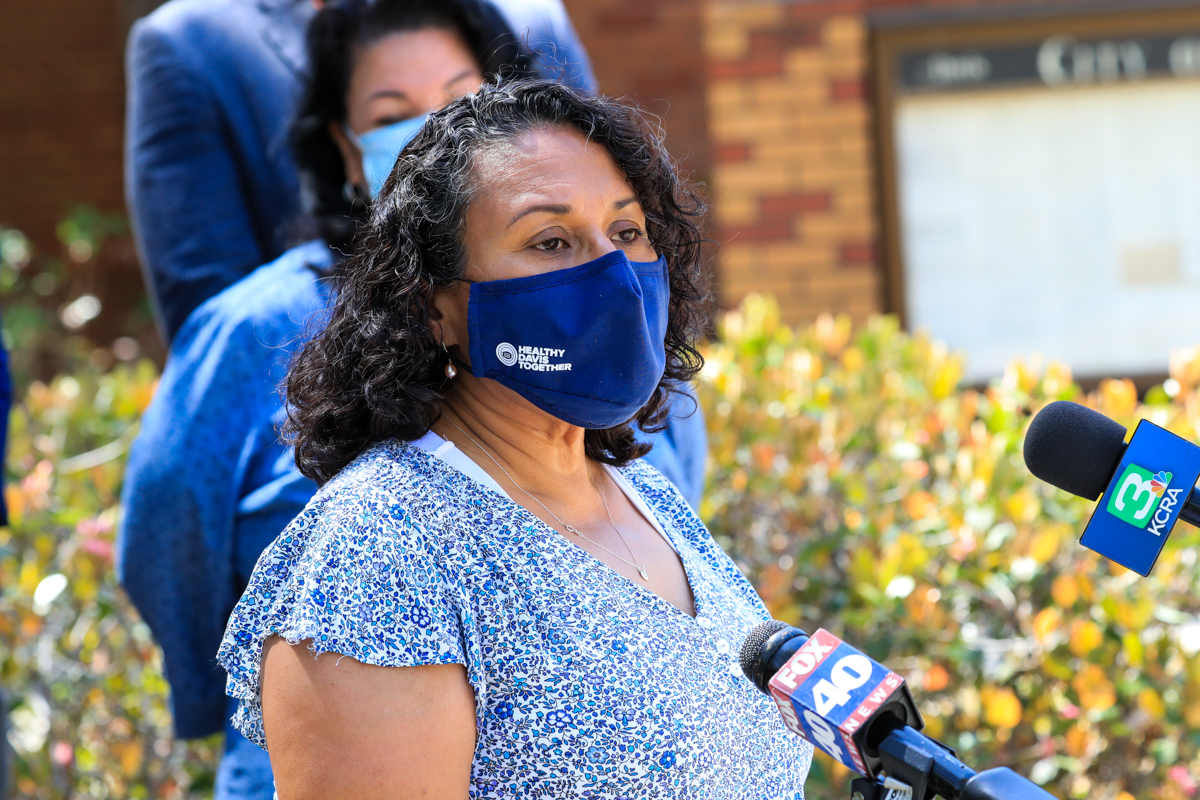

By David M. Greenwald
Davis, CA – A letter signed by over 600 individuals and groups was formally delivered to Mayor Gloria Partida at a press conference Monday afternoon outside of city hall, calling for a fundamentally new approach to community safety—one that is rooted in public health and proactive services rather than law enforcement and punishment.
Morgan Poindexter of Yolo People Power (and a Vanguard Board Member) delivered the remarks at the press conference flanked by, among others, Morganne Blais-McPherson, Nusrat Molla, Sule Anibaba, and Cecilia Escamilla-Greenwald.
“I would like to formally present our open letter for an independent department of public safety,” Poindexter said.
“This council has been consistently engaging in a process for almost a year,” she said. “This is urgent and necessary work. We are glad to have dedicated partners in this effort.”
The department would be responsible for all dispensation of services associated with non-violent safety calls, both emergency and non-emergency, under the leadership from a director with a background in public health.
“The department would address community health and safety needs,” she continued, explaining that this would include mental health care, addiction counseling and homeless outreach and support. “This department would be staffed by trained, unarmed mental health professionals instead of formal law enforcement officers.”
Poindexter added, “This department is a centerpiece of a new paradigm of public safety in the city of Davis.”
She said, “The separation of community services outside of the police department has many benefits and directly addresses the central asks of Black Lives Matter.”
Further, she said, “In order to meaningfully address decades of racial trauma and police brutality, we must listen to those affected when they explain the urgent needs for the complete separation of community support, mental health care crisis response, away from law enforcement and the criminal justice system.”

She added, “This would decrease unnecessary contact with armed law enforcement and end the criminalization of mental health care needs, homelessness and other social service needs.”
The letter, published by the Vanguard on Monday, noted, “Many Davis community members have been re-thinking public safety after episodes of police brutality and a long-time lack of adequate services for mental health issues, drug use, and houselessness. These issues have exacerbated racial disparities, which are particularly pronounced in Davis.”
It called on the council “to be bold leaders in responding to these issues by creating a department that prioritizes the well-being and safety of our community, particularly our most vulnerable. Such a department would take a twofold approach by first expanding access to social services such as free mental healthcare and programs to support houseless Davis residents.”
Mayor Gloria Partida received the letter following the remarks by Poindexter.
“I want to thank this group that has worked tirelessly through the last year and the Davis Community that is always engaged and always wants to be on the right side of history,” the mayor said.
“The direction that this community is asking to move is the right direction to be moving in,” Partida said. “The question of course is how to implement this in the most equitable and the most engaged way. We want to make sure that we hear all the voices.”
Though she did add, “There are always other voices that we have to consider in this process.”
She said that she and her colleagues have put in a lot of thought over the last year (over nine months since the death of George Floyd), and they have listened to the conversations in the Police Accountability Commission and the community.
“We are ready to discuss this (Tuesday) evening,” she said. “And to make sure that we ask the questions that need to be asked.
“For too long, the police have acted as the go-to managers of inequality in this country. Davis is no different. We need to reinvest in what makes us really safe, like free mental healthcare programs, and create structures with longevity aimed at promoting the well-being of all,” said Morganne Blais-McPherson, an educator and member of Yolo DSA (Democratic Socialists of America) & UAW (the UC student workers union) 2865.
“We have been doing community outreach and education for months, and we always receive such positive feedback! The evidence-based public safety reforms we are fighting for really are common sense to people of all ages, religions, lifestyles, and backgrounds. The people of Davis are very ready for these changes,” said Julea Shaw, a community activist with the Yolo People Power Research Team.
Morgan Poindexter explained to local media that they want the independent department of public safety “so that we can have cops do what they were trained to do and do them well. And have mental health professionals do the things that they were trained to do and do them well.”
—David M. Greenwald reporting
Support our work – to become a sustaining at $5 – $10- $25 per month hit the link:


Awww . . . isn’t that sweet
And nice job, DV, in placing that quote right below a quote from Gloria Partida that ended in an open quote (no ” at end), that made it appear our mayor was saying these things 😐
Grammatical structure matt-ers . # ^
IN contrast to the above quote, from the police response to the council:
I know when I want my inequity managed, I call 911! 😐
If you’re calling because you’re experiencing a:
Non-violent emergency, press 1.
A violent emergency, press 2.
A non-violent non-emergency, press 3.
A Violent non-emergency, press 4.
For any property crime whatsoever (in progress, or not) – press 5 to be connected with the system in San Francisco.
Or, you can rely upon one of our public health professionals to correctly identify your situation. If the status/nature of your call changes in the interim for any reason, best of luck to you.
. . . and my God have mercy on your soul 😐
It could be simpler than that.
Dispatch is not stupid. In dual response model, the police and the mental health expert both go anyway.
It is kind of like medical emergencies get a fire truck and an ambulance. Point being it is not that difficult to have multiple responders.
So where’s any savings?
According to Pytel’s report, that’s untrue.
“Law enforcement would only respond to cases involving violence, which is estimated to be less than 5% of the total calls that can be handled by mobile crisis teams.”
That said, not sure why you think there is going to be cost savings.
How many (percentage) would involve “crimes”? What, exactly, are public health experts planning to do when crimes are reported (of any type)? Also, is violence defined as only that which is currently “in progress”?
That’s what Cahoots claims, as you’ve reported. So, if that’s no longer part of the plan (e.g., in Davis), maybe that should be noted up-front.
What makes you think that “service” would be improved, as implied? How is “service” even being defined or evaluated?
David states:
But David, you wrote this? So which is it?
https://davisvanguard.org/2020/12/commentary-policing-doesnt-work-that-well-why-shouldnt-we-change-it/
CAHOOTS saves money, but they aren’t going to do CAHOOTS.
If they go to a private-public partnership, i.e. CAHOOTS, they can save money. Otherwise, they probably won’t.
CAHOOTS saves money, this I know
For the Vanguard tells me so
In terms of cost, do you mean that if someone (who is a professional) is willing to do it for free, then you have no problem letting them handle those calls? Then in a few months or a year, you can see the effect of such program.
If cost is not an issue at all, how would you evaluate whether the result is good or bad?
Cost is a quantitative measure, comparing current costs vs. proposed costs. Current costs include police/fire.
Proposed costs include police / fire / whatever the heck is being proposed. So, unless there’s a cutback in the first two, it appears that an “extra” cost is being proposed. (And given that the city recently purchased a ladder truck for the fire department, it seems that costs are not going to be cut, there.)
That’s my question, and perhaps more of a qualitative measure. Neither the problem nor the goal seem to be defined. According to some, it’s (somehow) related to George Floyd. Or, maybe the Picnic Day incident. Or, perhaps the purposeful, increased accommodation of homelessness.
The goal is that the episode de-escalates and the person with health crisis becomes stable.
If you compare the skill level of a police officer and an actual health expert, the officer would be more like a trainee and the expert is the trainer. Why would you doubt that the trainer would do worse?
You could ask the expert: “Do you think you can do better than the officer in such situations?” You would expect this reply, “Of course, I am the one training them and pointing out their errors and misconceptions.”
Seems to me that the police primarily respond to incidents of crime, and not calls for mental health services. How many calls to the police are something along the lines of, “help – I’m having a mental health crisis”? And, how are such calls handled now? Isn’t that something that generally requires hospitalization/evaluation?
Generally, someone comes to the attention of police when they’re either a perpetrator of crime, or a victim of it.
How well do you think a public health official would respond to a crime incident? What qualifications do they have to investigate, detain and arrest?
Again, police respond to crime, and are experts in that area. Public health officials are not trained to do so, and have no expertise whatsoever in that field.
Now, if Davis continues to purposefully accommodate homelessness, they’ll probably need an entire fleet of roving mental health care professionals. Because at that point, their “customer base” (those requiring frequent/increased services) will change (if it hasn’t, already).
“How many calls to the police are something along the lines of, “help – I’m having a mental health crisis”?”
The exact number is in one of the reports. But I can tell you from personal experience with our kid that we made quite a few calls to 911, and then they dispatched police and fire generally.
“How well do you think a public health official would respond to a crime incident? ”
They wouldn’t respond to a crime. They might co-respond to a crime. But in the above scenario, none what happened was criminal in nature. All of it was mental health. All of it could have been better handled with either a mental health professional or a co-response.
The implication in this statement to me is that the police chief knows that dispatch is capable of telling the nature of the incident and dispatch the health expert instead of the police as needed.
The context I understand is that even now, when dispatch sends a police officer in response, the officer also knows that it is a health crisis call. It is not a surprise to anyone.
The quote itself describes situations which would require “double-duty” (police AND mobile crisis teams).
I would think that one would first need to know how many calls (on average) would be handled by mobile crisis teams, vs. exclusively relying upon police. (Assuming that all such calls are currently routed to the police in the first place.)
This appears to be an “extra” city service provided, above-and-beyond what police normally provide. Not a “replacement”. Which means that costs would likely increase, unless some calls are currently routed to police which don’t need to be.
Regardless, I strongly suspect that (one way or another) the police/fire departments (and their budgets) would not “shrink” as a result of the additional program.
My fifth and last comment.
“I would think that one would first need to know how many calls (on average) would be handled by mobile crisis teams, vs. exclusively relying upon police. (Assuming that all such calls are currently routed to the police in the first place.)”
The staff report – based on similar programs in other jurisdictions – has an estimate that roughly 90 percent could be handled by the mobile crisis team alone. You’ll see the discussion in today’s article, there was a discussion between Pytel and Lucas Frerichs on this very issue.
Only ten minutes to 8:00pm, and already I am searching online for methods of ending it all —- after listening to the parrotic droning of the Democratic Socialists of America and Yolo People Power, most of whom can’t rewrite the talking points to iterate in their own words 😐 🙁 😐 I assume by midnight, after another four hours of this, the entire council will have joined me on the ‘other side’.